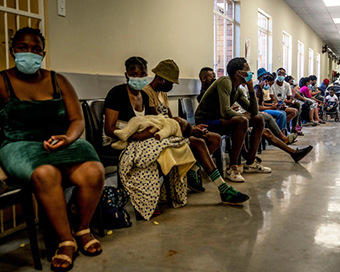Gallery
 PM Modi visit USA
PM Modi visit USA Only the mirror in my washroom and phone gallery see the crazy me : Sara Khan
Only the mirror in my washroom and phone gallery see the crazy me : Sara Khan Karnataka rain fury: Photos of flooded streets, uprooted trees
Karnataka rain fury: Photos of flooded streets, uprooted trees Cannes 2022: Deepika Padukone stuns at the French Riviera in Sabyasachi outfit
Cannes 2022: Deepika Padukone stuns at the French Riviera in Sabyasachi outfit Ranbir Kapoor And Alia Bhatt's Wedding Pics - Sealed With A Kiss
Ranbir Kapoor And Alia Bhatt's Wedding Pics - Sealed With A Kiss Oscars 2022: Every Academy Award Winner
Oscars 2022: Every Academy Award Winner Shane Warne (1969-2022): Australian cricket legend's life in pictures
Shane Warne (1969-2022): Australian cricket legend's life in pictures Photos: What Russia's invasion of Ukraine looks like on the ground
Photos: What Russia's invasion of Ukraine looks like on the ground Lata Mangeshkar (1929-2022): A pictorial tribute to the 'Nightingale of India'
Lata Mangeshkar (1929-2022): A pictorial tribute to the 'Nightingale of India' PM Modi unveils 216-feet tall Statue of Equality in Hyderabad (PHOTOS)
PM Modi unveils 216-feet tall Statue of Equality in Hyderabad (PHOTOS)The Badminton Association of India (BAI) has announced a 14-member-strong India squad for
- Men’s Sr Hockey Nationals to be played in division-based format from April 4
- Mensik denies Djokovic 100th title in Miami final
- KIPG: Son of a vegetable vendor, Bihar’s Jhandu Kumar eyes Worlds, 2028 Paralympics
- Hardik Singh credits hard work and team unity for receiving HI Midfielder of the Year award
- Djokovic, Alcaraz land in same half of Miami draw
Covid symptoms in South Africa milder than earlier waves: Report Last Updated : 10 Dec 2021 01:01:22 PM IST 
While Covid cases in South Africa driven by the super mutant Omicron variant have surged 255 per cent in the last week, the infections are showing milder symptoms than seen in the last three waves, according to the World Health Organization (WHO).
According to the WHO, Africa currently accounted for 46 per cent of reported Omicron cases globally, while the variant has spread to nearly 60 countries so far.South Africa's biggest private healthcare provider Netcare revealed that the recent rise in infections, which includes the Omicron and Delta variants, has been accompanied by a much smaller increase in admissions to intensive care beds, Dailymaverick reported."Having personally seen many of our patients across our Gauteng hospitals, their symptoms are far milder than anything we experienced during the first three waves," Netcare's Richard Friedland was quoted as saying to the South African daily."Approximately 90 per cent of Covid-19 patients currently in our hospitals require no form of oxygen therapy and are considered incidental cases. If this trend continues, it would appear that, with a few exceptions of those requiring tertiary care, the fourth wave can be adequately treated at a primary care level," he added.According to Friedland, "all patients had presented with mild to moderate flu-like symptoms, including a blocked or runny nose, headache and a scratchy or sore throat".During the first three waves, the overall community positivity rate breached 26 per cent across South Africa.Friedland said that in the first three waves of the pandemic, Netcare treated 126,000 Covid-19 patients, of which 44 per cent required admission and 26 per cent were treated in high care and intensive care units."Significantly, all Covid-19 patients admitted were sick and required some form of oxygen therapy. The high admission rate, as well as the high percentage of patients requiring ICU or high care is indicative of the severity of cases during the first three waves," he added.But, now the hospital has 337 Covid-19 positive patients admitted. Of these, approximately 10 per cent (33 patients) are on some form of oxygenation versus 100 per cent in the first three waves.Further, eight patients (2 per cent) are being ventilated and of these, two are primary trauma cases that are also Covid-19-positive, Friedland said."At present the 337 patients represent a fraction compared to previous waves," Friedland said."The very rapid rise in community transmission as compared to previous waves may partially explain this relatively low hospital admission ratea there does appear to be a decoupling in terms of the rate of hospital admissions at this early stage in the evolution of the fourth wave," he said.Friedland's comments echo earlier analysis from Dr Fareed Abdullah, of the South African Medical Research Council, who said many of the patients diagnosed with Covid in hospitals in badly hit Gauteng province and elsewhere were often "incidental" identifications in patients presenting with other conditions."The main observation that we have made over the last two weeks is that the majority of patients in the Covid wards have not been oxygen dependent. Sars-CoV-2 has been an incidental finding in patients that were admitted to the hospital for another medical, surgical or obstetric reason," Abdullah said."A snapshot of 42 patients in the ward on December 2 reveals that 29 (70 per cent) are not oxygen dependent. These patients are saturating well on room air and do not present with any respiratory symptoms. A significant early finding in this analysis is the much shorter average length of stay of 2.8 days for patients admitted to the Covid wards over the last two weeks, compared to an average length of stay of 8.5 days for the past 18 months."However, experts have said it is still too early in the Omicron outbreak to determine the longer-term course of the illness. Moreover, the country has reported an increase in infections in the younger population.IANS Johannesburg For Latest Updates Please-
Join us on
Follow us on








172.31.16.186







